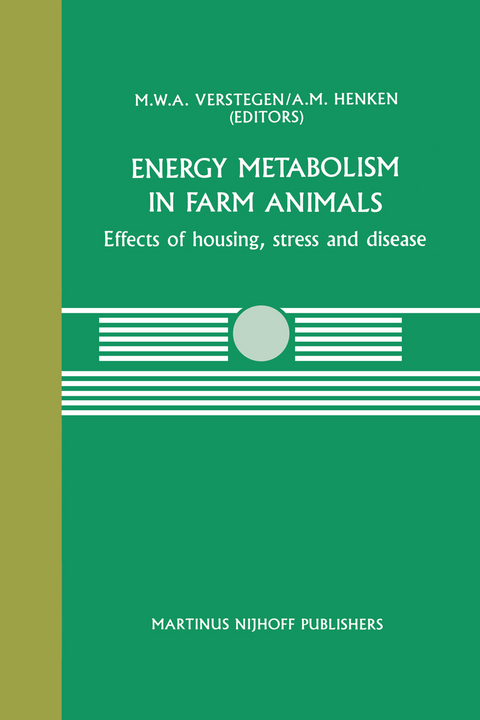
Energy Metabolism in Farm Animals
Springer (Verlag)
978-94-010-8010-1 (ISBN)
Animal production systems have changed dramatically over the last two decades. Knowledge of energy metabolism and environmental physio logy has increased as appears from many textbooks on these disciplines. The contents of the symposia on energy metabolism of farm animals show this and they have initially focussed on feed evaluation and later on com parative aspects of energy metabolism. They show part of the progress being made. Application of knowledge of energy metabolism for animals has a long history since Lavoisier. In addition to this, studies about the environ mental requirements of animals have shown that we are still far from ac curate assessment of these requirements in terms of nutrients and ener gy. I n model studies on energy metabolism researchers have recognized the interaction between the environment and the energy requirements of animals. Estimation of energy requirements has been done in physiolo gical, physical and behavioural studies. The impact of conditions as en countered by animals in various production systems has been approached from different viewpoints related to these different disciplines. In addi tion, various kinds of infections (bacterial, parasitic: subclinical, clini cal) have been evaluated only recently with regard to their effect on pro tein and/or energy metabolism and thus on production. People working in the field of feed evaluation have defined how che mical and physical properties of nutrition infiuence energy to be derived for maintenance and production.
I. Introduction.- Energy metabolism of farm animals.- The Wageningen respiration unit for animal production research: a description of the equipment and its possibilities.- II. Housing-Systems and Energy Metabolism.- Adaptation to, and energy costs of, tethering in pregnant sows.- Metabolic rate of piglets between sucklings.- Influence of some environmental, animal and feeding factors on energy metabolism in growing pigs.- The effects of housing conditions on energy utilization of poultry.- III. Climatic Conditions and Energy Metabolism.- Surface temperatures as parameters.- The influence of climatic environment on sows.- Thermal requirements of growing pigs from birth to slaughter.- A formula to describe the relation between heat production at thermoneutral as well as below thermoneutral temperatures simultaneously.- Effect of environmental temperature and air velocity two days preslaughtering on heat production, weight loss and meat quality in non-fedpigs.- Effects of climatic conditions on energy metabolism and performance of calves.- Climatic conditions and energy metabolism of laying hens.- Climatic environment and energy metabolism in broilers.- Heat tolerance of one-day old chickens with special reference to conditions during airtransport.- IV. Health and Aspects of Energy Metabolism.- Energy metabolism and immune function.- Parasite worry and restlessness caused by sarcoptic mange in swine.- Respiratory diseases in pigs: incidence, economic losses and prevention in the Netherlands.- Mastitis in dairy cows with special reference to direct and indirect effects of climatological factors.- The effect of gastrointestinal nematodes on metabolism in calves.- Energy and nitrogen metabolism of growing calves continuously infected with Dictyocaulus viviparus.- Respiratorydiseases in calves.- The effect of a subclinical Haemonchus infection on the metabolism of sheep (a pilot study).- Coccidiosis: a problem in broilers.- V. Variation in Energy Metabolism Characteristics Due to Feeding Level and Differences Between Breeds/Strains.- Effect of feeding level on maintenance requirements of growing pigs.- Genetic variation of energy metabolism in poultry.- Genetic variation of energy metabolism in mice.- Effects of body weight, feeding level and temperature on energy metabolism and growth in fish.
| Reihe/Serie | Current Topics in Veterinary Medicine ; 44 |
|---|---|
| Zusatzinfo | XVI, 501 p. |
| Verlagsort | Dordrecht |
| Sprache | englisch |
| Maße | 155 x 235 mm |
| Themenwelt | Naturwissenschaften ► Biologie ► Ökologie / Naturschutz |
| Naturwissenschaften ► Biologie ► Zoologie | |
| Veterinärmedizin | |
| ISBN-10 | 94-010-8010-0 / 9401080100 |
| ISBN-13 | 978-94-010-8010-1 / 9789401080101 |
| Zustand | Neuware |
| Haben Sie eine Frage zum Produkt? |
aus dem Bereich


